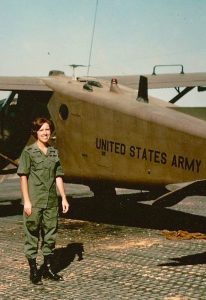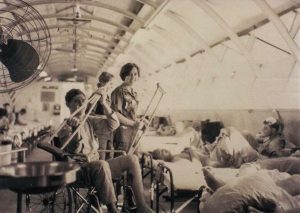Army veterans Diane Evans and Edie Meeks arrived in Plaiku, Vietnam on the same day in February of 1969. Both were from Minnesota, and they built an almost instant friendship. And they were “hooch” neighbors, so bunked right next to each other.
 Diane Evans in Long Binh, Vietnam in 1968. Courtesy of Diane Evans.
Diane Evans in Long Binh, Vietnam in 1968. Courtesy of Diane Evans.
In 1969, Plaiku was one of the hot spots of the war, and Diane and Edie worked as nurses on the front lines. They saw casualties of war firsthand, but they never shied away from their job of protecting their patients.
They came to StoryCorps to share their story of service.
 Diane Evans treating wounded soldiers at the 36th Evacuation Hospital in Vung Tau, Vietnam in 1968. Courtesy of Diane Evans.
Diane Evans treating wounded soldiers at the 36th Evacuation Hospital in Vung Tau, Vietnam in 1968. Courtesy of Diane Evans.
Top Photo: Diane Evans and Edie Meeks at the Vietnam Women’s Memorial in Washington, D.C. Courtesy of Diane Evans.
This broadcast is supported in part by the Corporation for Public Broadcasting, a private corporation funded by the American people, and the National Endowment for the Arts.
Originally aired November 5, 2022, on NPR’s Weekend Edition.


Your support makes it possible for StoryCorps, an independently funded nonprofit, to collect, archive, and share the stories of people from all backgrounds because everyone’s stories deserve to be heard.
